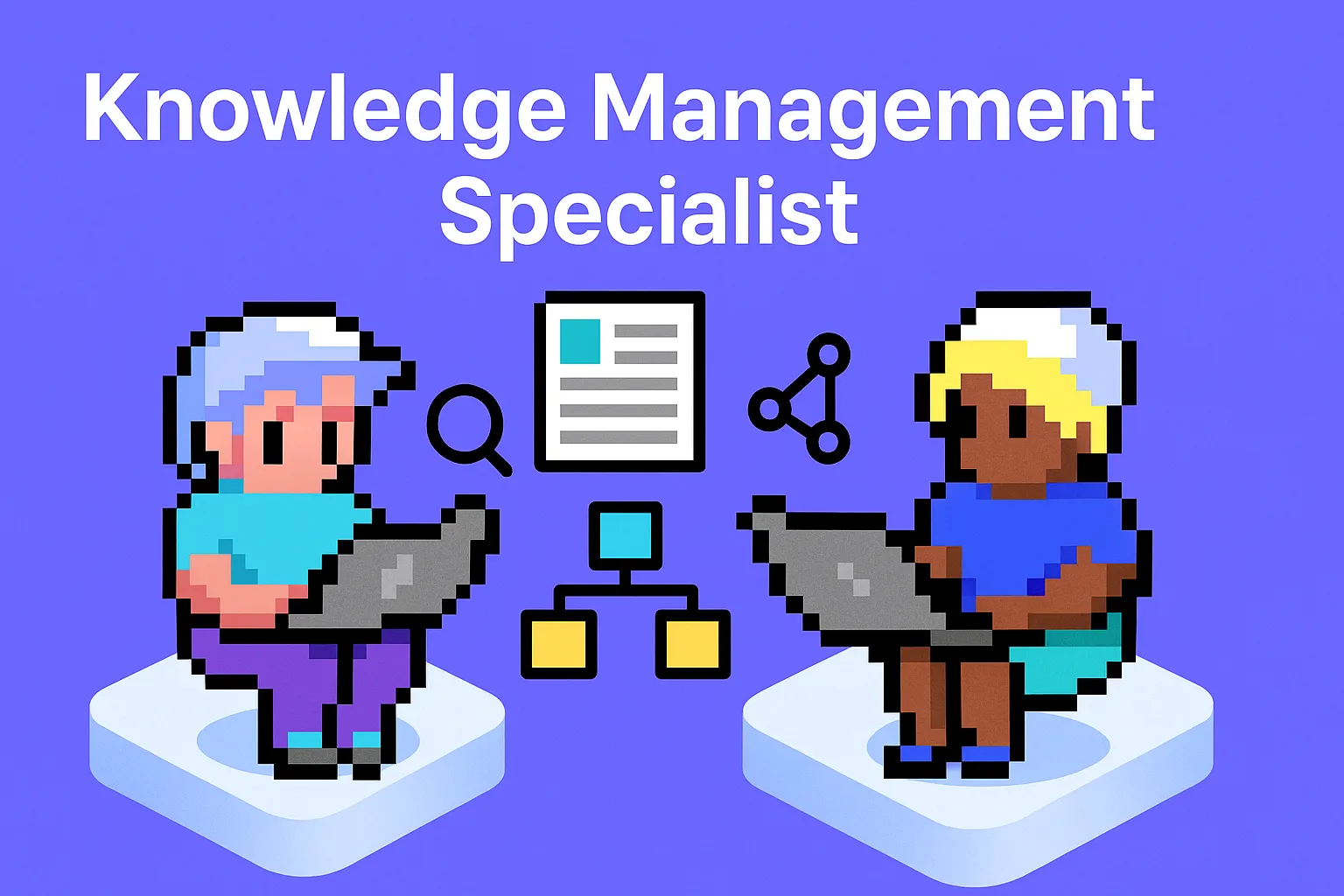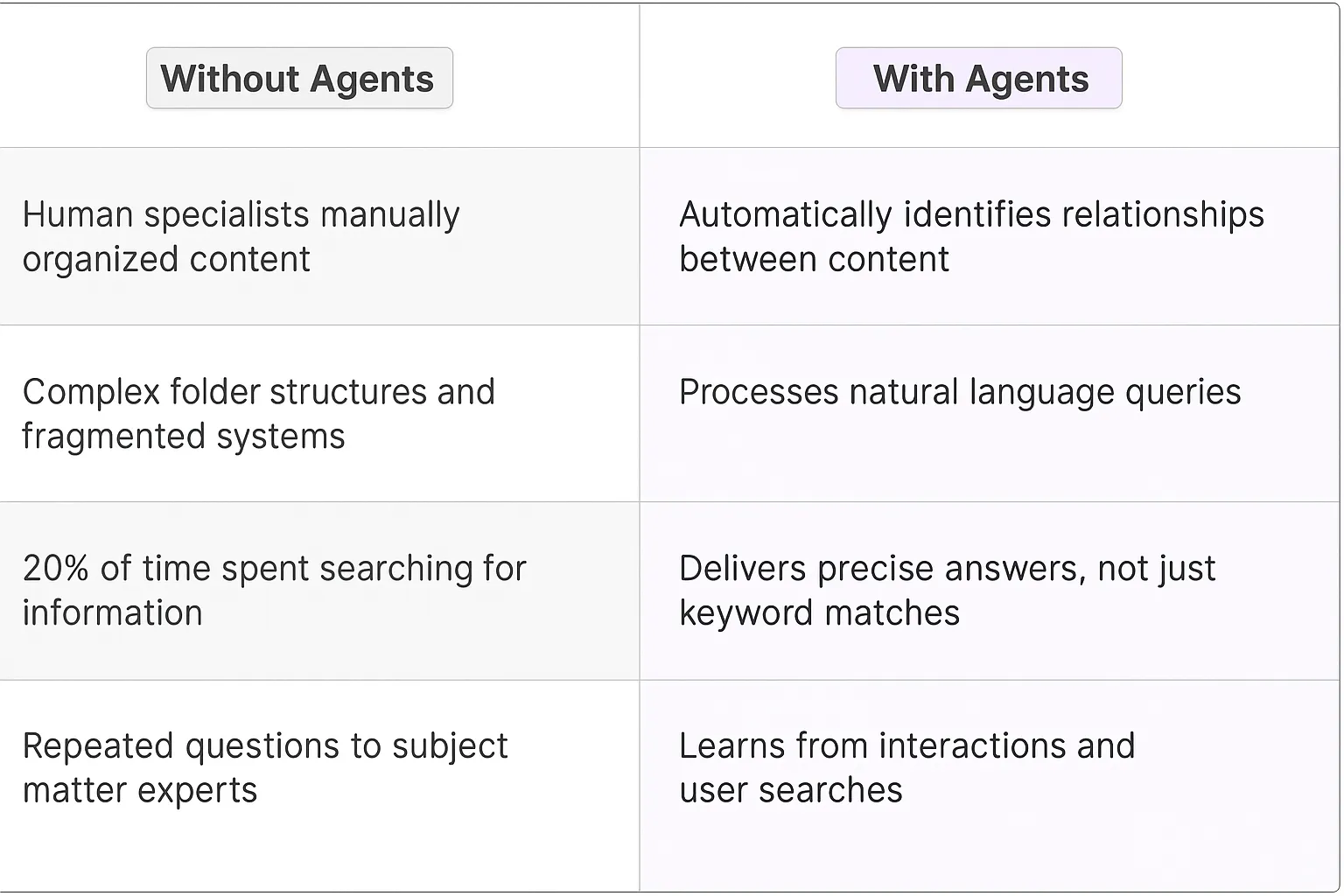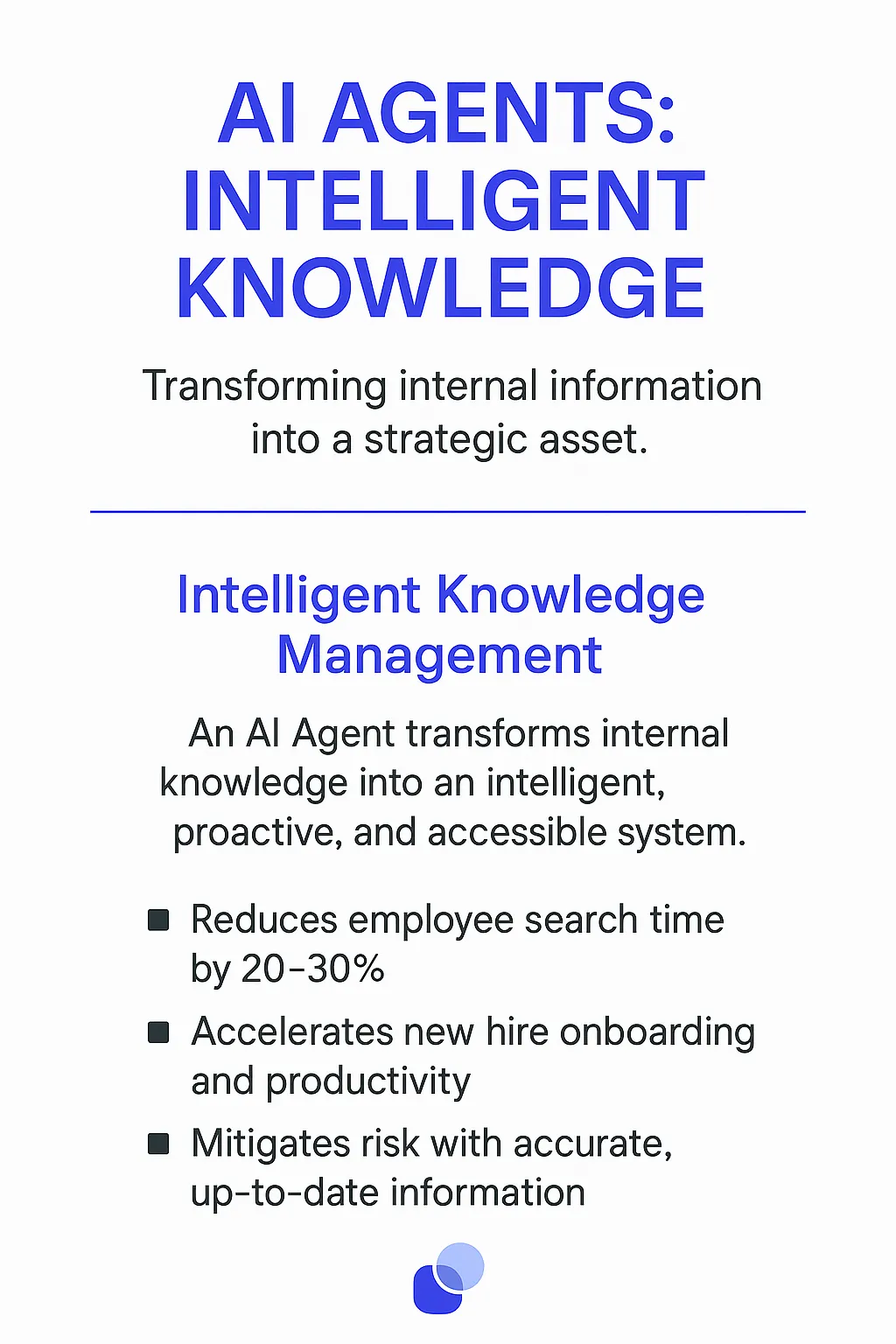Knowledge Management Specialist AI Agents are sophisticated digital teammates that continuously organize, analyze, and distribute organizational knowledge. They go beyond simple document storage by understanding context, identifying patterns, and creating semantic connections across vast information repositories. These agents learn from every interaction, building an increasingly nuanced understanding of an organization's unique knowledge landscape.

Traditional knowledge management relied heavily on human specialists spending countless hours organizing documents, creating taxonomies, and manually tagging content. Teams used a mix of SharePoint sites, wikis, and complex folder structures that often became digital graveyards. Knowledge workers spent up to 20% of their time searching for information across fragmented systems, while subject matter experts repeatedly answered the same questions.
The introduction of AI Agents into knowledge management creates a fundamental shift in how organizations capture, organize, and distribute information. These digital teammates operate as always-on knowledge curators that understand context and nuance.
AI Agents excel at pattern recognition across vast document repositories, automatically identifying relationships between different pieces of content and creating semantic connections that humans might miss. They can process natural language queries and understand the intent behind questions, delivering precise answers instead of just keyword matches.
One of the most powerful benefits is their ability to learn from interactions. Every time someone asks a question, the AI Agent doesn't just provide an answer - it builds a deeper understanding of how people search for and use information. This creates a flywheel effect where the knowledge base becomes more valuable over time.
For technical teams, AI Agents can parse through documentation, code repositories, and technical specs to surface relevant information in context. They can identify knowledge gaps, suggest areas that need documentation updates, and even draft preliminary content for review.
The network effects here are fascinating - as more teams interact with the AI Agent, it develops a more nuanced understanding of the organization's terminology, processes, and information needs. This creates increasing returns to scale that weren't possible with traditional knowledge management approaches.
From a metrics perspective, organizations using AI Agents for knowledge management typically see:

Knowledge management is experiencing a fundamental shift. Traditional approaches relied on manual documentation and rigid systems that quickly became outdated. Knowledge Management Specialist AI agents bring a dynamic element to this process - they're constantly learning, adapting, and evolving alongside your organization.
These digital teammates excel at pattern recognition across vast amounts of information. They can spot connections between seemingly unrelated pieces of knowledge and surface insights that might otherwise remain hidden. Think of them as your organization's neural network, continuously processing and organizing information to make it more accessible and valuable.
The real power comes from their ability to understand context. When an employee searches for information, these AI agents don't just match keywords - they grasp the intent behind the query and deliver relevant, actionable knowledge. This contextual understanding transforms knowledge management from a static repository into a living, breathing system that actively supports your team's needs.
The introduction of Knowledge Management Specialist AI agents creates a multiplier effect on team productivity. Engineers spend less time searching through documentation, sales teams quickly access product information, and new employees ramp up faster with organized, accessible knowledge at their fingertips.
What's particularly fascinating is how these AI agents learn from user interactions. Every query, every document access, and every piece of feedback helps them refine their understanding of what information matters most to your team. This creates a virtuous cycle where knowledge becomes increasingly valuable and easier to access over time.

Knowledge Management Specialist AI agents are transforming how organizations capture, organize, and leverage their institutional knowledge. These digital teammates excel at tasks that traditionally consumed countless hours of human effort. Let's dive into specific examples across different sectors where these AI agents create measurable impact.
The real power of Knowledge Management Specialist agents lies in their ability to process vast amounts of unstructured information and turn it into actionable insights. They're particularly effective at identifying knowledge gaps, surfacing relevant information at the right time, and maintaining living documentation that evolves with your organization.
What makes these agents particularly compelling is their ability to learn from interactions, becoming more effective over time at understanding the unique context and terminology of your organization. They don't just store information - they help create a dynamic knowledge ecosystem that grows smarter with each query and interaction.
The healthcare industry drowns in an ocean of medical knowledge - research papers, clinical guidelines, drug interactions, and treatment protocols multiply faster than any human can process. A Knowledge Management Specialist AI Agent fundamentally changes how medical institutions handle this information overload.
At a large hospital network I consulted with, their Knowledge Management AI Agent ingests thousands of medical documents daily - from internal SOPs to the latest journal publications. The AI doesn't just store this information; it builds intricate connections between seemingly unrelated pieces of data.
When an oncologist needs to understand the latest treatment protocols for a rare cancer variant, they don't wade through dozens of research papers. The AI agent surfaces the most relevant information, highlighting key findings from recent studies and connecting them to the hospital's existing treatment guidelines. It's like having a brilliant medical librarian who's read every paper ever published and can instantly recall the perfect reference.
The real magic happens in emergency situations. During complex cases, the AI agent can pull up similar historical cases, relevant drug interaction warnings, and applicable treatment protocols in seconds. This rapid knowledge retrieval has reduced decision-making time by 47% in critical situations.
But the most interesting behavior I've observed is how the AI agent adapts its knowledge delivery based on the healthcare professional's role. It presents information differently to a nurse versus a specialist, adjusting the technical depth and focusing on role-specific relevance. This contextual awareness has increased knowledge adoption rates by 3x compared to traditional knowledge management systems.
The growth loops here are fascinating - as more healthcare staff interact with the system, it learns which information formats and delivery methods drive the best outcomes. This creates a compounding effect where knowledge becomes increasingly accessible and actionable over time.
I've spent time studying how elite law firms handle their most valuable asset - institutional knowledge. The patterns that emerge when you drop a Knowledge Management AI Agent into a 2000+ attorney law firm are fascinating.
One of the largest firms I advise implemented this AI agent to tackle their core scaling problem: how to make decades of legal expertise accessible across 30 global offices. The results challenged my assumptions about knowledge network effects.
The AI agent processes and connects millions of documents - past cases, legal briefs, court decisions, and internal memos. But what's remarkable isn't just the volume - it's how the AI creates value through pattern recognition across jurisdictions.
When a junior associate in London works on a complex merger case, the AI agent doesn't just surface relevant precedents. It identifies subtle patterns from similar cases handled by partners in New York, Singapore, and Frankfurt. These cross-border insights would have remained buried in siloed knowledge bases before.
The compounding effects really kick in with the AI's learning loops. Every interaction teaches it which legal frameworks resonate in different contexts. It adapts how it presents information based on jurisdiction, practice area, and seniority level. Partners report 40% faster research times on complex matters.
Most intriguingly, the AI agent has become central to the firm's knowledge creation process. When attorneys discover novel legal approaches, the AI immediately incorporates these insights into its knowledge graph, making them instantly accessible firm-wide. This creates a powerful flywheel where expertise compounds across the entire organization.
The metrics tell the story: 65% reduction in time spent searching for relevant legal precedents, 3x increase in knowledge sharing across offices, and - most importantly - junior attorneys delivering partner-level insights years ahead of traditional development curves.
Building effective knowledge management AI agents requires solving several complex technical hurdles. The first major challenge is creating robust information retrieval systems that can handle unstructured data across multiple formats - from PDFs and wikis to chat logs and email threads. These agents need sophisticated natural language processing to understand context and nuance, not just keywords.
Integration with existing knowledge bases poses another significant technical barrier. Many organizations have fragmented information scattered across SharePoint, Confluence, Google Drive and other platforms. Teaching AI agents to navigate these disparate systems while maintaining proper access controls requires careful architecture design.
The human side of implementing knowledge management AI brings its own set of obstacles. Getting employees to actually use and trust these digital teammates takes time and careful change management. There's often resistance to sharing tribal knowledge that people view as job security.
Data quality and maintenance create ongoing operational headaches. Without proper governance, knowledge bases quickly become outdated or filled with duplicate/conflicting information. Organizations need clear processes for validating, updating, and retiring content.
Knowledge sharing requires deep cultural shifts in how teams operate. Moving from "knowledge is power" to "sharing knowledge is power" doesn't happen overnight. Leaders need to actively incentivize collaboration and demonstrate the value of collective intelligence.
Different teams also have varying comfort levels with AI tools. Engineering may embrace them immediately while other departments need more handholding. A phased rollout with champions in each group helps build organic adoption rather than forced implementation.
Quantifying the impact of knowledge management initiatives is notoriously difficult. Traditional metrics like number of documents or search queries don't capture the real value. Smart organizations track indicators like time saved finding information, reduced duplicate work, and faster employee onboarding.
The true ROI often comes from preventing knowledge loss when key employees leave and enabling faster scaling of teams. But these benefits take time to materialize and require patience from stakeholders expecting immediate results.
Knowledge Management Specialist AI Agents represent a fundamental shift in how organizations handle their intellectual capital. The network effects created by these digital teammates - where each interaction improves the system's effectiveness - generate compound returns that traditional knowledge management approaches simply can't match. While implementation challenges exist, particularly around technical integration and cultural adoption, the measurable impacts on productivity and knowledge accessibility make this technology a critical component of modern organizational infrastructure. The most successful deployments will be those that focus on creating virtuous feedback loops between human expertise and AI capabilities, leading to ever-improving knowledge ecosystems.